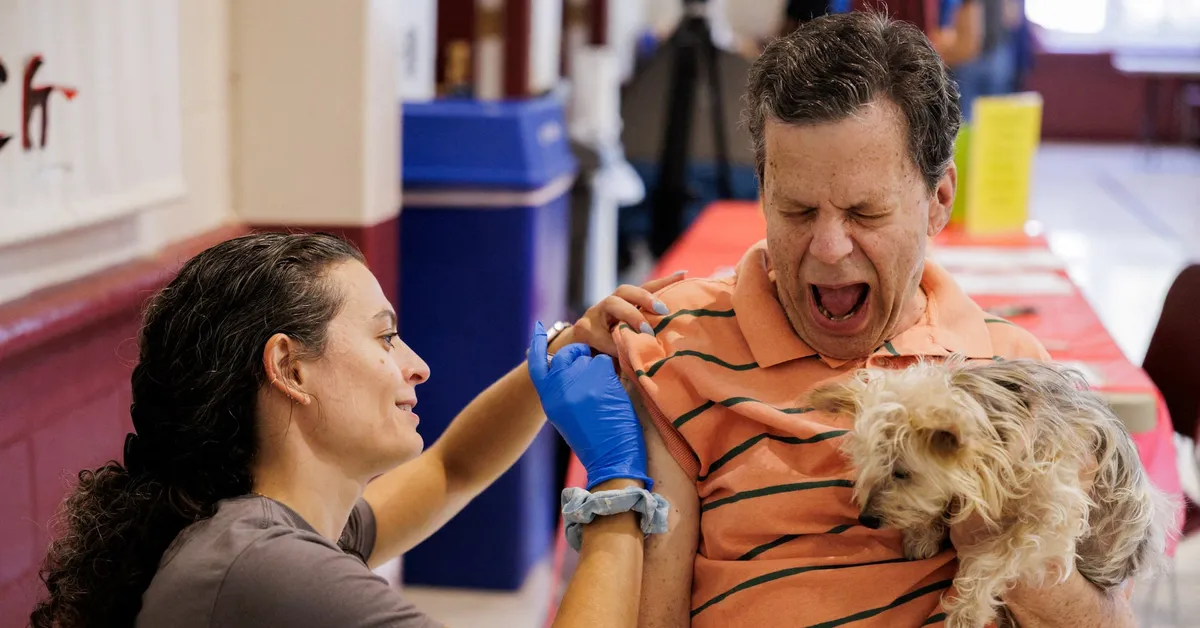
WASHINGTON, Sept 6 (Reuters) - President Donald Trump is standing firmly behind Robert F. Kennedy Jr., the U.S. Health Secretary, who is significantly transforming the U.S. healthcare landscape. This steadfast support comes despite mounting congressional pressure, rising public health concerns, and the political risks associated with altering vaccine policies across the nation. Since assuming the role of the top health official, Kennedy has made bold moves: he has reduced funding for vaccine research, restricted access to COVID-19 vaccinations, and dismissed the head of the Centers for Disease Control and Prevention (CDC), the agency responsible for U.S. vaccine recommendations.
Public health experts are raising alarms about the consequences of these changes on American health and wellness. They warn that a decline in vaccination rates could lead to outbreaks of infectious diseases, potentially placing the blame squarely on Trump. Nevertheless, the president has shown unwavering support for Kennedy, as noted by sources familiar with their relationship. This highlights Trump's willingness to take decisive actions that challenge traditional structures in U.S. society, whether in healthcare, academia, or the media.
During a recent press conference at the White House, Trump spoke highly of Kennedy, stating, "He's a very good person, and he means very well. He's got some different ideas." This comment came after lawmakers criticized Kennedy during a hearing earlier that day. Trump further expressed his appreciation for Kennedy's unique approach to health issues, emphasizing the need for innovation in the field.
While Trump and Kennedy maintain regular communication, a White House official indicated that their relationship is not as intense as Trump’s ties with other cabinet members. Despite their differing levels of passion on critical health issues, Trump continues to back Kennedy, trusting his judgment. Kennedy was appointed to the Health and Human Services position after he garnered support from the Kennedy-inspired Make America Healthy Again movement during the 2024 election cycle. Although Kennedy once ran for president as a Democrat and later as an independent, he eventually withdrew his candidacy to endorse Trump.
In December, Trump downplayed concerns regarding Kennedy's potential to enact radical reforms, assuring the public, "I think he's going to be much less radical than you would think." He continued, "I think he's got a very open mind, or I wouldn't have put him there."
Trump's own views on vaccines are notably complex. He has been credited with accelerating the development of life-saving COVID-19 vaccines during his presidency, yet he remains hesitant to fully endorse them due to the skepticism among his political base. Recently, Florida leaders announced a plan to abolish all state vaccine mandates, including those required for school attendance. Trump appeared to question this move, stating, "You have some vaccines that are so amazing... You have to be very careful when you say that some people don't have to be vaccinated. It's a very tough position."
Polling data reflects a shift in attitudes toward vaccines, with Democrats becoming increasingly trusting while Republicans show growing skepticism. A Reuters/Ipsos poll conducted in May revealed that 75% of Democrats view vaccines for diseases like measles and rubella as very safe for children, a notable increase from 64% in May 2020. In contrast, the percentage of Republicans expressing similar beliefs dropped from 57% to 41% over the same period.
Trump is acutely aware of this political landscape and has adjusted his approach accordingly, as noted by Marc Short, who played a key role in the administration's pandemic response. Short cautioned that Kennedy faces risks if public health outcomes deteriorate. "If there's something that the president views as embarrassing, he has a unique capacity to cut bait and go a different direction," Short stated. Recently, Trump took to social media, suggesting that vaccine manufacturers should demonstrate that their products have saved millions of lives.
Reflecting Trump's ambivalence on vaccine issues, a White House official remarked that the president feels he does not receive adequate credit for Operation Warp Speed, the initiative he launched to expedite vaccine development. During a tumultuous hearing, bipartisan lawmakers expressed their discomfort with Kennedy's leadership, yet they acknowledged the significance of Operation Warp Speed, which muted some of their criticisms against him. Moreover, a Republican senator cited data showing that 89% of voters, including 81% of Trump voters, agree that vaccine recommendations should be based on expert advice.
Despite the criticism, Trump’s allies and administration members, including Vice President JD Vance, defended Kennedy on social media, dismissing the concerns raised by lawmakers. Vance stated, "You're full of shit and everyone knows it." Meanwhile, some public health officials warn that the alliance between Trump and Kennedy could lead to severe ramifications for public health and biomedical research. Gregg Gonsalves, an associate professor at the Yale School of Public Health, remarked that this "marriage of convenience" could result in "unprecedented and disastrous results" for the healthcare system.